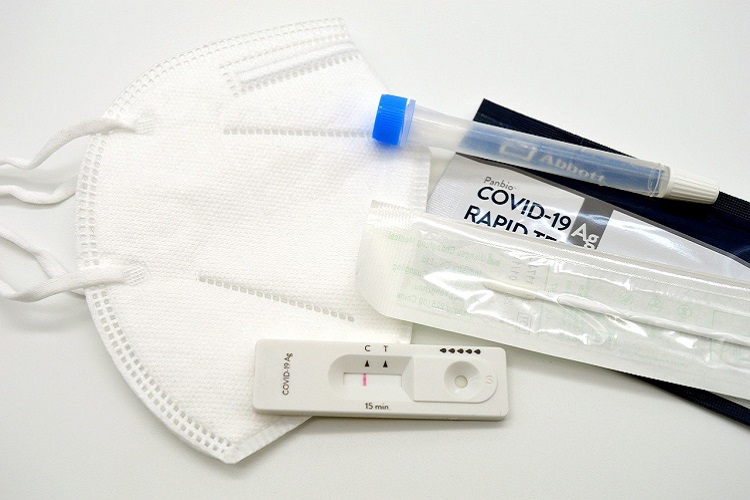2 November 2021
A study by researchers at the University of Bristol found low uptake of COVID-19 lateral flow testing among university students, particularly among ethnic minority groups. Barriers to engagement with testing included a lack of awareness, problems accessing the service, concerns about the accuracy and safety, and a preference for other infection control strategies such as self-isolation.

The COVID-19 pandemic continues to have profound effects on daily life in the UK. Lateral flow testing of asymptomatic people remains an integral part of the UK’s COVID-19 response. There has been much debate around the use of lateral flow tests (LFTs) to detect asymptomatic infections, particularly regarding test accuracy. However, much less attention has been paid to levels of uptake of testing, which may pose a major barrier for the use and effectiveness of asymptomatic testing.
In December 2020, amid high levels of COVID-19 infections, the government recommended that all university students should have two negative LFTs before travelling home for the winter break. The University of Bristol rapidly rolled out a testing programme for asymptomatic students.
The researchers conducted a mixed methods evaluation of the testing programme comprising an analysis of testing uptake data, an online student survey and in-depth interviews with students.
The findings revealed that only one in 10 students had the recommended two LFTs and highlighted demographic disparities in uptake by ethnic group, level of study and year group, and faculty.
Data collected from survey and interview participants suggested that whilst students were generally positive about testing, key barriers to uptake remain. Many students were motivated to take tests to protect those around them and avoid transmitting the virus to their friends and family. However, students reported a number of barriers to uptake including a lack of awareness of the testing service, problems accessing the service, a lack of knowledge and understanding of testing procedures, and concerns about the accuracy and safety of testing.
Although overall uptake was low, many of those who did not take tests described a lack of need for tests, either because they were not travelling, were unlikely to have been exposed to the virus, were already isolating, or were tested elsewhere.
Dr Sarah Denford, Research Fellow from the NIHR Health Protection Research Unit in Behavioural Science and Evaluation at University of Bristol and joint lead author, said: “Although overall uptake was low, our research provides a number of possible explanations for this. Many students were aware of the ongoing debates about the accuracy of lateral flow tests and were opting to use other strategies, such as PCR tests or self-isolation, before travelling. However, our research also identified a number of ways in which testing services may be improved. Targeted information and communication campaigns may be needed to increase the use of testing among student populations.”
Dr Clare French, Research Fellow from the NIHR Health Protection Research Unit in Behavioural Science and Evaluation at University of Bristol and joint lead author, said: “Our findings should be used to inform the wider debate around the usefulness and appropriateness of the widespread use of lateral flow testing for asymptomatic people. The particularly low uptake among some groups of students suggests that innovative strategies may be required to achieve equity in access to and uptake of testing.”
Pre-print paper: Low uptake of COVID-19 lateral flow testing among university students: a mixed methods evaluation by Clare French and Sarah Denford et al. Published on medRxiv.
Please note this is a preprint, so it is a preliminary piece of research that has not yet been through peer review and has not been published in a scientific journal – so this is early data.
Further information
About the NIHR Health Protection Research Unit [HPRU] in Behavioural Science and Evaluation at the University of Bristol
The NIHR HPRU in Behavioural Science and Evaluation at University of Bristol is one of 14 HPRUs across England, part of a £58.7 million investment by the NIHR to protect the health of the nation.
The NIHR HPRU in Behavioural Science and Evaluation is a partnership between the UK Health Security Agency (UKHSA) and University of Bristol, in collaboration with MRC Biostatistics Research Unit at the University of Cambridge and University of the West of England.
Each NIHR HPRU undertakes high quality research that is used by UKHSA to keep the public safe from current and emerging public health threats.
About the NIHR
The mission of the National Institute for Health Research (NIHR) is to improve the health and wealth of the nation through research. We do this by:
- Funding high quality, timely research that benefits the NHS, public health and social care;
- Investing in world-class expertise, facilities and a skilled delivery workforce to translate discoveries into improved treatments and services;
- Partnering with patients, service users, carers and communities, improving the relevance, quality and impact of our research;
- Attracting, training and supporting the best researchers to tackle complex health and social care challenges;
- Collaborating with other public funders, charities and industry to help shape a cohesive and globally competitive research system;
- Funding applied global health research and training to meet the needs of the poorest people in low and middle income countries.
NIHR is funded by the Department of Health and Social Care. Its work in low and middle income countries is principally funded through UK Aid from the UK government.